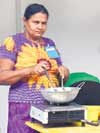Coming together of business minds Tangalle – “Most of those in this region earn a living through food processing in one way or another. Fairs like this are needed to offer marketing opportunities to those participating so they have the chance to move into larger scale production. If this happens, family incomes will increase, allowing the next generation to get richer and improve their lives.”
Those were the comments from Chamal Rajapaksa, Minister for Agriculture, when asked why he thought the Hambantota Food Processing Fair at Tangalle Town Hall held last weekend was so important. The fair was organised by MercyCorps, a humanitarian organisation, and managed by Victory Exhibitions & Conventions. It was the second such fair organised by MercyCorps, after one in Ampara. There were 85 exhibitors, both local and national to show off their wares, as well as getting together for the mutual benefit of both, well that was the aim and it did come about with a little prodding, according to Sarah Buckley, Regional Programme Manager, MercyCorps. For the local contributors, that number was around 30. When we first met it was not long after the opening by the Agricultural Minister, and Ms Buckley was feeling confident that a lot of what was learned from Ampara was going to make this fair even more successful.
“One of the reasons, I think, is that Tangalle is a more business-orientated place, plus Victory has done a very good job as far as organising and targeting the right business people to show here. They are better fitted to the needs of the locals,” she said, adding that the businesses were specifically invited this time, whereas before the companies answered an advertisement. This being The Sunday FT's second visit to this fair, after Ampara, what Ms Buckley said was actually true. There were a greater variety of nationwide businesses offering a range of opportunities and potential benefits to the local representatives and those just visiting.
Two of those were Pixel Arts and surprisingly, the Galadari Hotel. Surprisingly, because as Ms Buckley said, “At first I had no idea what such a hotel would have to offer. And as you can see, they are very popular.” And so they were for both days. But back to the Pixel Art Company for a moment: based in Kandy, their representatives were selling interactive learning CDs in Sinhala. The subjects being taught ranged from Microsoft XP, to Adobe Photoshop, to CoralDraw, among others “Of course, you have to have the actual software on the computer, but the CD gives very clear and concise instructions on how to learn the workings of these somewhat daunting programmes,” said Wijerathna Dunukewila, Business and Promotions Co-ordinator, Pixel Art. Even though the prices for the CD went up to Rs 650, the guys working the booth were carrying out a roaring trade. And with the central government's and private sector’s move to give more people access to computers to offer the chance to improve their lives, access to these learning CDs can only help. The hotel was invited to educate the local people on the dishes that could be made from local ingredients, such as milk, fish and rice, said Imroze Salih, one of the three Sous Chefs at the booth (see box). On catching up with the minister again, he was asked what the government was doing to help the people in the region. He said that the relevant ministries were working together to pass on technologies needed to improve the quality of life. “Government agencies are listening to what is needed and looking for ways to supply those needs. That should be helped by the number of infrastructure projects that are going on in the region, such as the airport in Weerawila, the extension of the railway, and the proposed seaport, among others. All this will help improve the living standards of the people,” he said. For Manaram Dairy Products, the fair was not about expanding countrywide, just to expand locally. Based in Tangalle, the company had been going for two years, where it produced 10,000 pots of yogurt a month. The warm milk was delicious, it must be said.Back talking to Ms. Buckley, she said that those with stalls, when looking around themselves, were taking the event more seriously this time, noting that more information was being swapped. "Victory has been very instrumental in this. As this is an agribusiness show, there were problems getting those businesses who normally don't deal with the sector to attend, but with the right questions and answers, Victory managed to get them to come.
Then again, there was more media involvement this time,”
she said. On a brief visit the next day, Ms. Buckley was still happy as far as how things were going. She did admit that there were still some things that hadn't happened as they should; an example being a notice board to tell those visiting who was doing a presentation when, but as usually happens in these circumstances, it arrived there and then. One interesting tale did come out though from the regional programme manager. She decided to introduce a representative from a company that sells the bags and machines that seal them, to a woman who sold snacks in locally-produced wrapping. As the gent noticed, the snacks had a shelf life of three months if properly sealed, but the woman’s bags would not keep the freshness for that length of time. The thing is her wrapping cost just Rs 0.60, while his cost Rs 2. She admitted she would be willing to charge more to ensure the better bag, but was she likely to? And that is the $60,000 dollar question. The problem here is you can introduce people to each other, where business could be conducted and money made, but the problem is getting the small-scale producer to aim for the next level. The fair aimed to do that, but if it actually gets the entrepreneurial part of that person to move ahead, that is something else. As in most things in life, there are risks, but some people just aren’t willing to take them. But at least MercyCorps is helping people to move in the right direction. The fair was funded by JP Morgan.
|
||||||||||
Copyright © 2006 Wijeya Newspapers
Ltd. All rights reserved. |




